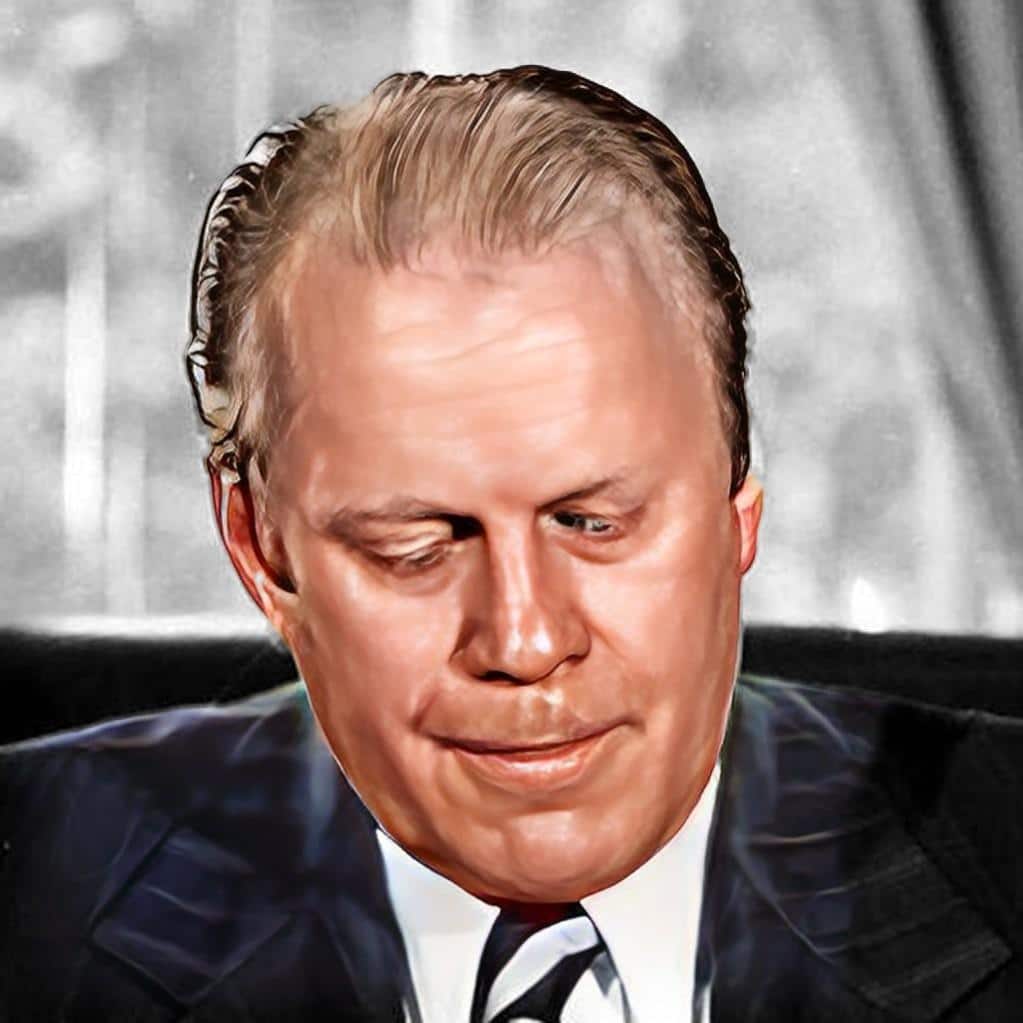What is the net worth of Gerald Ford?
Gerald Ford net worth is US$ 7 Million.
| Net Worth | US$ 7 Million |
| Born | July 14, 1913 |
| Gender | Male |
| Height | 6′ |
| Spouse | Betty Ford |
| Country of Origin | Omaha, Nebraska, US |
| Source of Wealth | American Politician, Acting |
| Famous For | 38th President of the United States |
Gerald Ford Biography
Gerald was the 38th President of the United States, working from the year 1974 to 1977. He was born on July 14, 1913, in Omaha region, Nebraska, and brought up in Grand Rapids, Michigan. Gerald Ford went to the University of Michigan and Yale Law School, where he played football and was named an All-American.
Ford was a member of the US House of Representatives from the year 1949 to 1973, serving as Minority Leader from 1965 to 1973. In 1973, he was appointed Vice President by then-President Richard Nixon after Spiro Agnew resigned. After Nixon’s resignation in 1974, Ford became President.
As a President, Ford faced many challenges, including inflation, recession, and a strained relationship with Congress. He is best known for his controversial decision to pardon Nixon for any crimes he may have committed during the Watergate scandal.
After leaving office, Ford remained active in politics and philanthropy. He established the Gerald R. Ford Foundation, which promotes civic engagement and leadership, and he was awarded the Presidential Medal of Freedom in 1999.
Ford passed away on December 26, 2006, at the age of 93. He is remembered as a leader who valued honesty, integrity, and bipartisanship, and who worked to heal the divisions of the Watergate era.
Early Life
Gerald Ford was born in the year 1913, in Nebraska, to Dorothy Ayer Gardner and Gerald Ford Sr. His parents got separated when he was a teenager, and he was raised up by his mother and stepfather in Grand Rapids, Michigan. Ford had three younger half-brothers from his mother’s second marriage.
Growing up, Ford was active to a large extent in sports and played football, basketball, and track in high school. He continued playing football at the University of Michigan, where he earned a Bachelor of Arts degree in economics. After graduation, he turned down offers to play professional football and instead attended Yale Law School, where he was a member of the Delta Kappa Epsilon fraternity.
In addition to his academic and athletic pursuits, Ford served in the US Naval Reserve from 1942 to 1946, rising to the rank of lieutenant commander. He was stationed in the Pacific theatre during World War II and participated in several combat missions.
After the war, Ford returned to Grand Rapids and became involved in local politics. He was elected to the US House of Representatives in 1948, beginning a long and successful career in public service.
Gerald Ford Career
Gerald Ford’s career spanned several decades and included positions in both the legislative and executive branches of the US government.
He was first elected to the US House of Representatives in the year 1948 and went on to work in Congress for 25 years, becoming Minority Leader in the year 1965. During his time in Congress, Ford was known for his moderate political views and his ability to work across the aisle to get things done.
In 1973, Vice President Spiro Agnew resigned amid allegations of corruption, and President Richard Nixon nominated Ford to replace him. Ford was confirmed by Congress and served as Vice President until 1974 when Nixon resigned over the Watergate scandal and Ford became President.
As President, Ford faced a number of challenges, including inflation, high unemployment, and a struggling economy. He also had to deal with the aftermath of Watergate and the Vietnam War, which left many Americans disillusioned with their government.
Despite these challenges, Ford worked to restore faith in government and to promote bipartisanship. He was known for his honesty and integrity and for his willingness to listen to opposing viewpoints.
After leaving office, Ford remained active in public life, serving on various commissions and boards. He also established the Gerald R. Ford Foundation, which promotes civic engagement and leadership.
Highlights
Gerald Ford’s presidency was marked by a number of notable events and accomplishments. Here are some of the highlights:
1. Pardoning Nixon: One of Ford’s most controversial decisions was to pardon Richard Nixon for any crimes he may have committed during the Watergate scandal. The decision was widely criticized, but Ford argued that it was necessary to move the country forward and to avoid a lengthy and divisive legal battle.
2. Helsinki Accords: In 1975, Ford signed the Helsinki Accords, a major diplomatic achievement that helped to improve relations between the United States and the Soviet Union, the power at that time. The Accords also established a framework for human rights protections in Europe.
3. Economic Policy: Ford faced significant economic challenges during his presidency, including inflation, recession, and high unemployment. He pursued a number of policies aimed at addressing these issues, including tax cuts and deregulation.
4. Foreign Policy: Ford was an active and engaged leader on the world stage, traveling extensively and meeting with foreign leaders. He also oversaw the evacuation of Americans from Vietnam following the fall of Saigon in 1975.
5. Focus on Integrity: Ford was known for his commitment to honesty and integrity in government. He worked to restore faith in the presidency after the Watergate scandal and was seen as a leader who could be trusted to do the right thing.
Frequently Asked Questions about Gerald Ford
Q. What was Gerald Ford’s political affiliation?
A. Ford was a Republican.
Q. How did Ford become President?
A. Ford was appointed Vice President by Richard Nixon in 1973 and became President after Nixon resigned in 1974.
Q. What is Ford’s legacy?
A. Ford is remembered as a leader who valued honesty, integrity, and bipartisanship. He worked to heal the divisions of the Watergate era and to restore faith in government.
Q. What was Ford’s stance on the Vietnam War?
A. Ford inherited the Vietnam War from Nixon and oversaw the evacuation of Americans from Saigon in 1975. He was criticized by some for not doing enough to support South Vietnam.
Q. What other positions did Ford hold before becoming President?
A. Ford served in the US House of Representatives for 25 years and was Minority Leader from 1965 to 1973. He also served in the US Naval Reserve during World War II.
Q. What was Ford’s relationship with Nixon?
A. Ford and Nixon had a complex relationship, with Ford serving as a loyal Vice President but also criticizing Nixon for his involvement in the Watergate scandal.
Q. What was Ford’s economic policy?
A. Ford pursued a number of policies aimed at addressing inflation, recession, and high unemployment, including tax cuts and deregulation.










